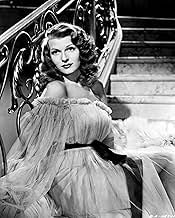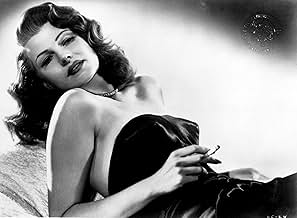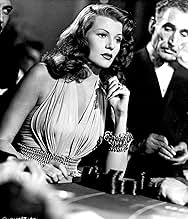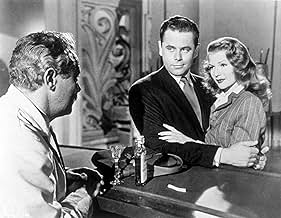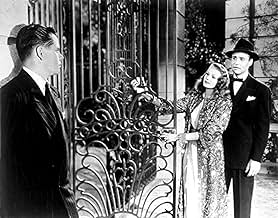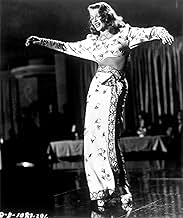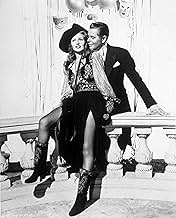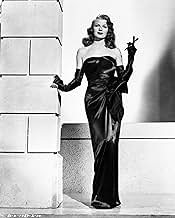Ein Gelegenheitsspieler, der eine Anstellung in einem Casino in Buenos Aires erhält, entdeckt, dass die neue Frau seines Chefs seine Ex-Geliebte ist.Ein Gelegenheitsspieler, der eine Anstellung in einem Casino in Buenos Aires erhält, entdeckt, dass die neue Frau seines Chefs seine Ex-Geliebte ist.Ein Gelegenheitsspieler, der eine Anstellung in einem Casino in Buenos Aires erhält, entdeckt, dass die neue Frau seines Chefs seine Ex-Geliebte ist.
- Auszeichnungen
- 4 Gewinne & 1 Nominierung insgesamt
- Gabe Evans
- (as Robert Scott)
- Thomas Langford
- (as Don Douglas)
- Newsman
- (Nicht genannt)
- …
- Gambler
- (Nicht genannt)
- Nightclub Patron
- (Nicht genannt)
- Blackjack Dealer
- (Nicht genannt)
- Girl at Carnival
- (Nicht genannt)
- Gambler
- (Nicht genannt)
- American Cartel Member
- (Nicht genannt)
Empfohlene Bewertungen
"Gilda" is the film that made Rita Hayworth a star, and (with "Paths of Glory") gave Macready his justifiable claims to being one of Hollywood's best villains. Ironically many people don't think of Macready as anything but a villain in movies. It is true that in films like "Lady Without a Passport" and "The Big Clock" he was a villain, but he also could play decent people. He tries to help Spencer Tracy escape recapture and execution in "The Seventh Cross", and he is the wise minister and reformer who helps thwart Ray Milland (a.k.a. the Devil) in "Alias Nick Beal". But his Balin is pure, malevolent ice. There has been some suggestion that Balin's relationship with Johnny is actually a homosexual one (the business with the knife in the cane possibly being a metaphor for a male sex organ). Perhaps, but it is a weird friendship of two cynics who (briefly) enjoy each other's cynicism.
Curiously enough the business of the tungsten cartel is rarely discussed in going over the film. Like "Notorious" which came out about the same time, "Gilda" reminded American audiences of the large numbers of Nazis and collaborators who fled to South America in this period. In "Notorious" it was Brazil, and the gang (led by Alex Sebastian - Claude Rains) was fooling around with uranium. Here the idea of such people controlling a useful metal's manufacturing was not probed as much, probably because Balin was set to double cross them. But it is worrying to think of them coming so close to it.
In a discussion of the Warner Baxter film, "Such Men Are Dangerous" I mentioned that (like that film) there is a hint here of the 1928 mysterious death of millionaire Alfred Loewenstein, who managed to fall out of his private airplane over the English Channel. Here, to evade both the Nazis and Calleia, Balin arranges his plane to explode over the ocean (although the audience and Calleia see a figure parachute before it does so). Not quite the same problem as the Loewenstein mystery, but one can see the seed of the idea was there.
I would say this was certainly one of the better film noirs. It even was somewhat thought provoking.
Hayworth may either be the intruding wedge that comes between Glenn Ford and George Macready or the object of both men's romantic interests. From the initial meeting between Ford as two-bit gambler Johnny Farrell and Macready as Ballin Mundson the casino owner, an ambiguous, possibly homo-erotic, attraction is established between the two men. The lingering looks that they exchange can be read in several ways, but Bogie never looked into Cagney's eyes like Ford looks into Macready's. After Ford begins to work for Macready, his devoted care and slavish attention to his boss's needs exceed the bounds of employee and employer. When Hayworth moves into Macready's home as his new wife, Ford returns the key to the house as though he were a jilted lover. Ford's increasing jealousy becomes apparent after Hayworth's arrival on the scene, but it is unclear of whom he is jealous, Hayworth or Macready or possibly both. Perhaps Ford's character is as unsure of his own feelings as is the viewer, which makes the ambiguity even more intriguing. Macready's jealousy also grows as the heat between Ford and Hayworth intensifies, but, again, it is ambiguous of whom he is jealous.
With a dazzling performance by Hayworth, excellent black-and-white photography by Rudoph Mate, fine direction by Charles Vidor, and layers of psychological possibilities to ponder, "Gilda" is as golden as its title suggests.
Our story unfolds in Buenos Aires. Which as you watch the movie is easy to forget because there is absolutely no South American flavor to the proceedings. The story might as well be set in Milwaukee. Anyhow small-time gambler and successful cheater Johnny Farrell somehow finds himself running a high-class casino after the casino's owner, Ballin Mundson, takes a liking to him. Everything is going swimmingly until one day, completely out of the blue, Ballin returns home from a trip with a beautiful new wife in tow. This woman is going to cause all kinds of complications. This woman of course is Gilda and right from the start, from her first memorable moment on the screen, Hayworth takes hold of the movie. Gilda's a fascinating character with so much lurking under the surface. And what's on the surface ain't so bad either. Not for nothing was Hayworth the era's most popular pinup girl. A shame then that the movie can't take full advantage of the allure and talents of its star.
Hayworth is vibrant, exciting, bursting with life. The movie is not. In playing Johnny Farrell, the character we unfortunately spend more time with than we do with Gilda, Glenn Ford comes across as being somewhat dull. And his character is rather unlikable. The story contains some elements which fall flat. There's something about a tungsten cartel which involves some angry Germans. This of course has nothing to do with Gilda. Can we just get back to Gilda? Please? Somewhere along the way the story really gets bogged down and not even Hayworth can fully rescue it. Everyone will remember Hayworth's big moments. She makes quite the impression with her famous singing and dancing. Well dancing anyway as the singing voice isn't hers. But nevertheless that famous number, "Put the Blame on Mame", is quite the spectacle. Now who to put the blame on for surrounding the fabulous Hayworth with an otherwise very ordinary movie? You'll love Rita. Love the movie? That's a stretch.
Glenn Ford is the anti-hero of this excellent Noir portrait of double-crosses, jealousy, and forbidden love. He has many flaws, not the least being his infatuation of Gilda. Director Charles Vidor looked as though he was trying to capture a CASABLANCA-esque feel with the casino in Buenos Aires and people of all walks of life toiling within. There are even some familiar head nods at a roulette table. This is no CASABLANCA, but the end of WWII is somewhere in the backdrop and the stoic "Ballin Mundson", played by George Macready (PATHS OF GLORY), seems to have some foreign matters happening on the side, like "Victor Lazlo". The crisp black and white cinematography is effective, especially in the casino where 2/3 of the film takes place.
GILDA is all Hayworth and, whether you are a male or female viewer, you see a good performance. She is great to look at, but her dramatic scenes are equally great to see. GILDA is an all-time classic that ranks with MALTESE FALCON and DOUBLE INDEMNITY. Throughout the picture, the blame is put on Rita for most of the plot's turning points. There may just be someone as sweet as her flowing red hair inside waiting to come out. Glenn Fords' Johnny Farrel (perfect name for Noir character) cannot look past her deceiving flirtation and realize that the bad guy is right in front of him. Another triumphant film of the 1940's that works every time, GILDA is Rita Hayworth's claim to fame and sent her into the stratosphere as a star. She was more than just a pin-up.
RATING: 9 of 10
Modern film femme fatales are a pale shadow by comparison, for example Linda Fiorentino or Sharon Stone. I'm not sure why. It could be either that nowadays allure is too much equated with sex or nudity (less tantalising than several dashes of suggestion) or maybe it's that present day equivalents are portrayed as hard as nails without the necessary mix of sadness and vulnerability.
Whatever, if you've never appreciated what the appeal of 40s noir is, this is definitely one to try.
Wusstest du schon
- WissenswertesThere is a rumour that this film is the only time Rita Hayworth's real singing voice is heard, but that is not true. According to the bonus features from the DVD, Hayworth actually never recorded her own singing voice and was a talented lip-syncher. Anita Ellis dubbed almost all of her singing in this film. Hayworth always wanted to do her own singing, and Columbia Pictures chief Harry Cohn paid for her voice lessons, but she never developed a voice he considered strong enough to be used; Hayworth remained bitter about that for the rest of her life.
- PatzerWhen Farrell asks to cut the deck at the blackjack table, he shuffles the deck prior to the cut; this is not allowed.
- Zitate
Gilda: You do hate me, don't you, Johnny?
Johnny Farrell: I don't think you have any idea of how much.
Gilda: Hate is a very exciting emotion. Haven't you noticed? Very exciting. I hate you too, Johnny. I hate you so much I think I'm going to die from it. Darling...
[they kiss passionately]
Gilda: I think I'm going to die from it.
- VerbindungenEdited into Head (1968)
Top-Auswahl
- How long is Gilda?Powered by Alexa
Details
Box Office
- Weltweiter Bruttoertrag
- 5.999 $
- Laufzeit1 Stunde 50 Minuten
- Farbe
- Seitenverhältnis
- 1.37 : 1


